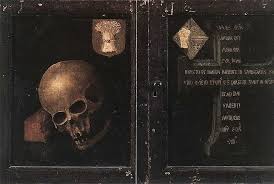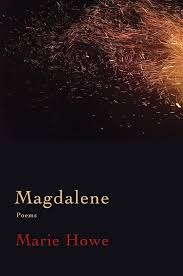
The greatest mystery in life is death. Yet another coup for irony, no? And also for literature, which has been preoccupied with this central mystery ever since Adam & Eve brought the (tree) house down by biting an apple, thus opening the door for that narrow fellow not-in-the-grass.
As for me, I’m not above getting on the mystery train myself. Or of using light humor to treat such heavy topics. The poem “Death of a Conversation” (included in this post), found in the first section of my new book Reincarnation & Other Stimulants, attracted the attention of translator Ralph Polumbo. Taken by the comic exchange between two neighbors – one a man trying to get to his car for a grocery trip, the other an ex-Jesuit hazarding answers to the great beyond – Polumbo decided to translate the poem (also include in this post) for a Spanish audience .
The lapsed Jesuit, Peter, has a thing for irony, too. His theory on the other side points to the contrast between the light people with near-death experiences claim to see and the dark that has been debated by others in both ways metaphorical and literal. Whether Peter has lost his way is left for the reader to decide. As for the poem’s speaker, he is simply in a situation familiar to all of us, trying to disengage himself from small talk so he can return to the task at hand.
Here is the poem, which originally appeared in The Westchester Review, followed by Polumbo’s translation:
Death of a Conversation
by Ken Craft
Peter catches me between front door and car,
pretends to weed around marigolds. “Oh hey.”
That casual greeting his specialty. Daily conversations
mostly desultory before he breaks into his pet topic:
suicide. I know, a bad sign, but idle talk of killing himself
is Pete’s sole joy in life. At least he’s not overly repetitive.
He’s too much the lapsed Jesuit for that.
“That blinding light they talk about at the end,” he says.
“All bullshit. Black as coal dropped down a well at midnight,
if you want the truth. You recall anything –
a blessed thing — before you were born?
I want to say yes, I do, in fact. Make up stuff
about bullets bubbling the surf off Normandy,
the stench of canvas and sleeping soldiers in tents
under Shiloh’s heat, the wet patch of earth stuck to
Squanto’s umber knees as he finally stands
in his Pilgrim field of corn seed and fish corpse.
“It’s what makes death so easy,” he says. “It’s why
every fool manages it so professionally. It’s not
like we meet some snowy-bearded Maker
after unmaking ourselves — an angry God
directing us to Hell for jay-walking violations.
Mercifully, he never talks ways or means. Never razors
or hoses from exhaust pipes to windows of opportunity.
And certainly never the taste of metal, the last bullet
train to nighttime Tokyo.
“In fact it’ll be peaceful like the Garden of Eden
before the damn fruit and the sweet-talking serpent. Trust me.”
I want to trust him. I do. But I have to buy a quart of 2% milk.
A dozen pastured, cage-free eggs. Unbleached flour.
“Deer been at your hydrangeas again,” I note, pointing.
He glances at his patch of Eden, and I take the opportunity
to tell him I have to go. We all do, eventually.
Muerte de una Conversación
by Ken Craft, Ralph Polumbo (Translator)
Pedro me detiene entre la puerta de entrada y el automóvil,
simula estar quitando las malezas de alrededor de las caléndulas. -¡Oye!
Ese saludo informal es su especialidad. Las conversaciones diarias,
generalmente inconsistentes, antes de irrumpir en su tema favorito:
suicidio. Lo sé, un mal señal, pero cháchara de suicidarse
es la única alegría en su vida. Al menos él no es demasiado repetitivo.
Él es demasiado reflexivo el ex Jesuita para eso.
-Esa luz cegadora de la que hablan al final –dice.
Son todas mentiras. Negro como el carbón cayó en un pozo a la medianoche,
si quieres saber la verdad. ¿Tú evocas algo –
alguna bendición- antes de nacer?
Quiero decir que sí, de hecho, lo recuerdo. Inventar algo acerca
de las balas burbujeando las olas en la costa de Normandía,
el hedor de lonas y los soldados dormidos en tiendas de campaña
bajo el calor de Shiloh, el húmedo parche de tierra pegado
a las rodillas marrones de Squanto, mientras él finalmente se para
en su campo Peregrino de semillas de maíz y cadáver de pez.
-Es lo que hace que la muerte sea tan fácil, -él dice. -Es por eso que cada
tonto lo maneja tan profesionalmente. No es que
nos encontremos con un Creador de barba
nevada después de deshacernos –un Dios enfadado
que nos dirige al infierno por cruzar la calle imprudentemente.
Afortunadamente, él nunca habla de formas o medios. Nunca de navajas
o mangueras de tubos de escape a las ventanas de oportunidades.
Y ciertamente nunca del sabor del metal,
del último tren a Tokio nocturno.
-De hecho será tranquilo como el Jardín del Edén
antes de la fruta maldita y de la serpiente que habla dulcemente. Confía en mí.
Yo quiero confiar en él. Yo sí. Pero debo comprar un cuarto de galón de leche al dos por ciento.
Una docena de huevos de pastura, libres de jaulas. Harina sin blanquear.
-El venado estuvo en tus hortensias nuevamente, – lo noto, señalando.
Él echa un vistazo a su porción de Edén, y aprovecho la oportunidad
para decirle que debo irme. Todos lo hacemos, eventualmente.
Translating is no easy business. Tough enough in prose, it is considered even more challenging in poetry, where questions of literal vs. figurative language arise, not to mention the minefields presented by idioms, slang, and sound devices.
Still, when you wake to find one of your poems speaking another language overnight, it’s a bit of a shock. Just like that, poems smarter than their author. Bilingual, even!
As for me, I’m OK with it. Flattered, even. After all, I’m still trying to conjugate the verbs to lie and to lay.





